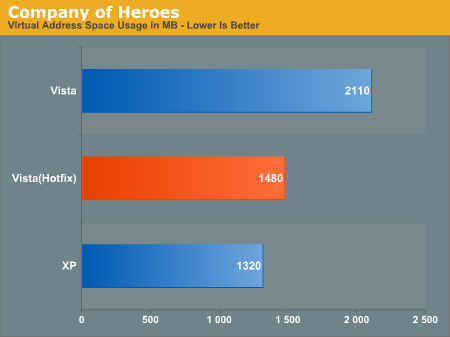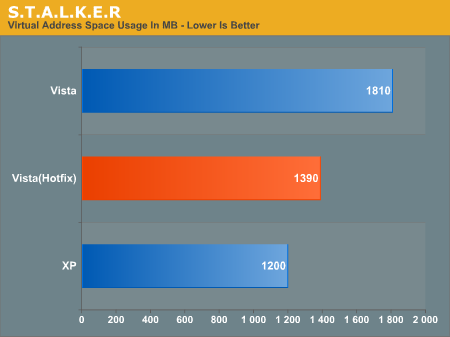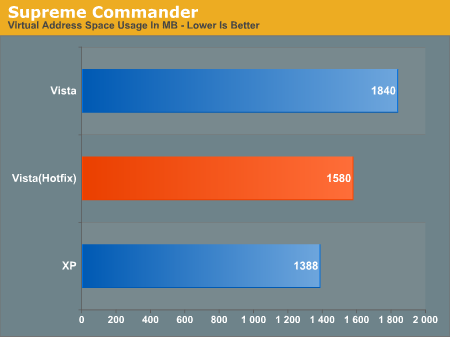A Messy Transition (Part 3): Vista Buys Some Time
by Ryan Smith on August 13, 2007 3:00 PM EST- Posted in
- Systems
Testing the KB940105 Hotfix
Unfortunately the fix is not all roses at this time. Microsoft classifies this as a hotfix which may still be undergoing further testing, which means they aren't recommending that most users install this fix, nor are they even making the fix easy to get. Microsoft's official recommendation is that users not severely affected wait until the fix is delivered as part of a service pack, which would mean that it will not be normally distributed until Vista SP1 in late 2007 or early 2008, and it certainly won't be part of the next "Patch Tuesday".
Right now the only official way to acquire the hotfix is to directly call Microsoft and ask them for the hotfix, which they will supply for free. On August 23rd, Microsoft will publish the fix on the KB article page for anyone who wants to download it ahead SP1's release. For those not wanting to wait until the 23rd, we have seen the hotfix for download on various websites; however, we'd advise an extra level of caution if downloading the hotfix from an unofficial site due to the popularity of fake Microsoft patches loaded with Trojan horses.
The patch is officially supported by Microsoft, so we do not believe there are any serious problems with it, and in our testing we did not encounter any issues. We have however heard from one source that this fix is dependent on some changes that also need to happen at the video driver level. We can't substantiate this, but all the same we would recommend not installing this patch without first installing the most recent drivers for your video card.
To get an idea of how much the hotfix can reduce virtual address space usage, and if this comes with any kind of performance tradeoff, we once again ran our battery of games that have extreme virtual address space usage against Vista with and without the hotfix, and against XP as a baseline.
| Software Test Bed | |
| Processor | Intel Core 2 Quad QX6850 (3.00GHz/1333MHz) |
| RAM | G.Skill DDR2-800 (2x2GB) |
| Motherboard | Gigabyte GA-P35-DR3R (Intel P35) |
| System Platform Drivers | Intel 8.1.1.1012 |
| Hard Drive | Maxtor MaXLine Pro 500GB SATA |
| Video Cards | 1 x GeForce 8800GTX |
| Video Drivers | NV ForceWare 163.11 |
| Power Supply | OCZ GameXStream 700W |
| Desktop Resolution | 1600x1200 |
| Operating Systems | Windows Vista Ultimate 32-Bit Windows XP SP2 |
| . | |
We'll start with Company of Heroes mission 6, which as we saw in part 2 had the biggest difference in virtual address space usage of all the games in comparing Vista and XP.

Whereas Company of Heroes would surpass the 2GB barrier under Vista just loading this mission without the hotfix, the game is safely under the 2GB barrier with the hotfix applied. Under Vista the game is still using an additional 160MB of virtual address space compared to XP, but this is far better than the gap being the entire size of the video memory on our 8800GTX prior to the hotfix.


Both STALKER and Supreme Commander show similar, albeit not as great improvements, shaving off 420MB and 260MB respectively. This shows that not all games benefit from the hotfix to the exact same degree, although from our limited sample we can extrapolate that every game should be reduced to near its optimal situation, as Vista is consistently using around 160-200MB more virtual address space than XP with the hotfix installed.
However, we also need to ask: Does the hotfix incur any performance penalty compared to not using the hotfix?
| Overall Vista Game Performance | |||
Company of Heroes |
S.T.A.LK.E.R |
Supreme Commander |
|
| Vista | 110.2fps |
58.1fps |
4:15 |
| Vista(Hotfix) | 110.2fps |
58.1fps |
4:15 |
| . | |||
With performance numbers literally the same with and without the hotfix, we can safely say that there is not a performance penalty for using this hotfix.










37 Comments
View All Comments
initialised - Thursday, February 14, 2008 - link
After installing Vista SP1 on a Maximus/QX9650/4GB system it showed a full complement of 4GB under Vista Ultimate 32mbIchinisan - Tuesday, August 14, 2007 - link
Can we take a look at how SLI is affected by this? With two 1GB video cards, could you hit the addressing limit in XP (or two 768MB GTXs or 640MB GTSs for that matter)? I remember that you had trouble doing that.leexgx - Tuesday, August 14, 2007 - link
SLI systems have the same work space as one card an 7900 GTX 512 in SLI does not turn it into an 1GB video SLI system the frame buffer is still 512mb (last time i checked as Both cards Need the same Textures as both cards render half of the video thats why its was Daft calling an 7950 GX2 with 1gb of video ram (basicy 2x7900 GT cards running off 1 PCI-E) when it can only Use 512MB of it)Blacklash - Tuesday, August 14, 2007 - link
MS was gutless and decided not to push it. Instead of trying to create demand by instilling desire, which can easily be done through effective marketing, they took the lazy "there's no demand" approach. What makes me angry is they have the money to create a hell of a marketing blitz if they so desire, and could even eaten the possible initial loss of attempting to force a move to x64 if they had to. Get a spine MS. Go for it.MadAd - Tuesday, August 14, 2007 - link
of course they didnt push it. The natural time to swap to x64 was the recent vista launch, but A. Intel were still playing catchup with x64 on c2d and B. After all that time in development they had to get some return, so they fobbed us off with the x32 as the mainstream product, which is really at the end of its life now.So what next? Well M$ know damn well that half the rest of the world are waiting for SP1 before touching vista with a bargepole so that'll be hurried out the door and dressed up in more BS marketing..and then what?
Filling the marketing void between SP1 and whatever next will be the 'transition to 64' era. Yes yes lots of chubbly money to be made giving people what they want, not when they need it like now, but when its best to make the most money from it.
BikeDude - Thursday, August 16, 2007 - link
They recently announced that Windows Server 2008 is the last server product to support 32-bit CPUs. It is not known at this time if the next client version of Windows will also drop 32-bit CPUs.But the writing is on the wall. Sort of.
However... A lot of users will not benefit from a 64-bit OS, but can still use 32-bit Vista just fine. Many will see the increased memory usage of 64-bit Vista as a problem (despite the cheap memory prices) performance-wise. For the vast majority of users, it makes little sense. Some of them may even be using some 16-bit Windows software for all we know... Why force them into problems they don't need? 32-bit Vista is a great stepping stone to 64-bit Vista. There is a choice, and I think most of us needs it.
If you look at the forums (and the article we are commenting), many punters advocate sticking with 32-bit Vista for the foreseeable future. It is a cowardly stance in my opinion, but they present some valid concerns.
poohbear - Tuesday, August 14, 2007 - link
very informative article! dont mean to be nit picky, but u guys use words in some wierd contexts: a program taking "sovereign control" of memory? "assumingly"? lol interesting usage. cheers for a great article nonetheless!Tristesse27 - Tuesday, August 14, 2007 - link
Ryan, with all respect, you seriously need to learn how to use commas.Larso - Tuesday, August 14, 2007 - link
As long as you are running 32 bit, with 32 bit addressing, the ultimate barrier will always be 4 GB. So isn't this 2 GB barrier problem a bit acedemic, as we are only one bit short of spending all 32 bits of addressing anyways? We are already hitting the roof and a factor of two is not significant in the long run.But hitting roofs seems to make people paranoid, which is understandable with the otherwise unlimited resources of a modern PC. But everybody seems to have forgotten how it was in the old days. How hardware limitations forced developers to be creative and ingenious with great results. You don't see that today, it seems more like developers are acting like spoiled kids.
Perhaps its healthy to face a hard resource limitation again, so developers will be forced to make efficient use of the resources. Its not that 2 GB is a tiny amount of memory, it's actually a huge amount. And when there is a justified case for using more, there is always 64-bit.
MadBoris - Tuesday, August 14, 2007 - link
It's by no means huge for games, which have always pushed hardware to it's fullest.
The problem is that those that set the limits, are the most guilty of waste (MS). Try using managed .NET and see RAM usage climb exorbitantly in applications. Vista itself claims extensive amounts of RAM as applications open up on the PC (w/ superfetch off). Also Vista uses more CPU cycles compared to XP for a game (maybe only certain games, maybe not). I also didn't ask MS to commit 20+- percent of a CPU core to sound as they think I should do now in Vista w/ software.
As we get more hardware resources MS is right there to "waste" it, not really using it efficiently or gaining performance from more HW resources, which should be the obvious result. Cutting out hardware sound best suited their needs (I really think it had more to do with pushing xact and moving devs to 360 consoles). Furthermore, tighter control on GPU makers with restricted WDDM helped their needs with a prettier desktop to compete with MAC (maybe wddm2 will bring more to the table). DX10+ API's also now further limit the individual 3D features that GPU companies can expose in their hardware, they have to have the API support first to expose features and WDDM support to expose how resources are managed.
I'm not into MS bashing or conspiracy theories, but their comes a point that "Sovereign" control becomes better for the king and worse for the people, it inhibits creativity. Maybe it will take an "upheavel" but that sure won't come from any outspoken hardware MFR's or IHV's because they have to maintain best relations, regardless how poorly and yet dominantly, MS steers the ship.
Devs will have to become smarter with resources, but as this article clearly shows, that needs to begin with Microsoft first, they are most guilty in the OS and dev languages and runtimes. So I am not exactly filled with confidence when they remove hardware sound and take tighter control of the future of 3D features with their API support and hardware functionality with their driver models.
It's not an MS rant, but if MS is going to take tighter control of all the reins, and everyone else has to adapt to them, then they should be the ones to answer for things. Since they made it their responsibility, they should be held accountable not the companies like Creative and Nvidia that have to struggle with the difficulty of adapting to the stringent choices MS makes (for their competitive reasons).